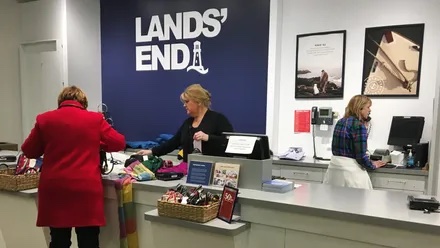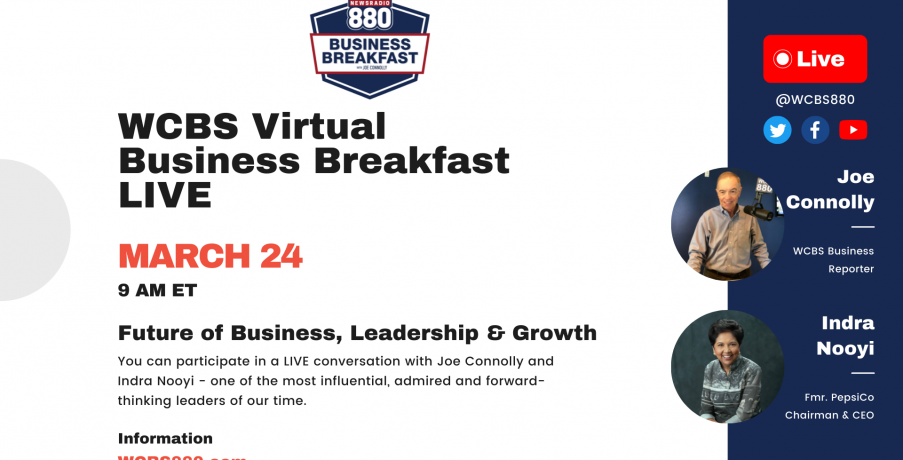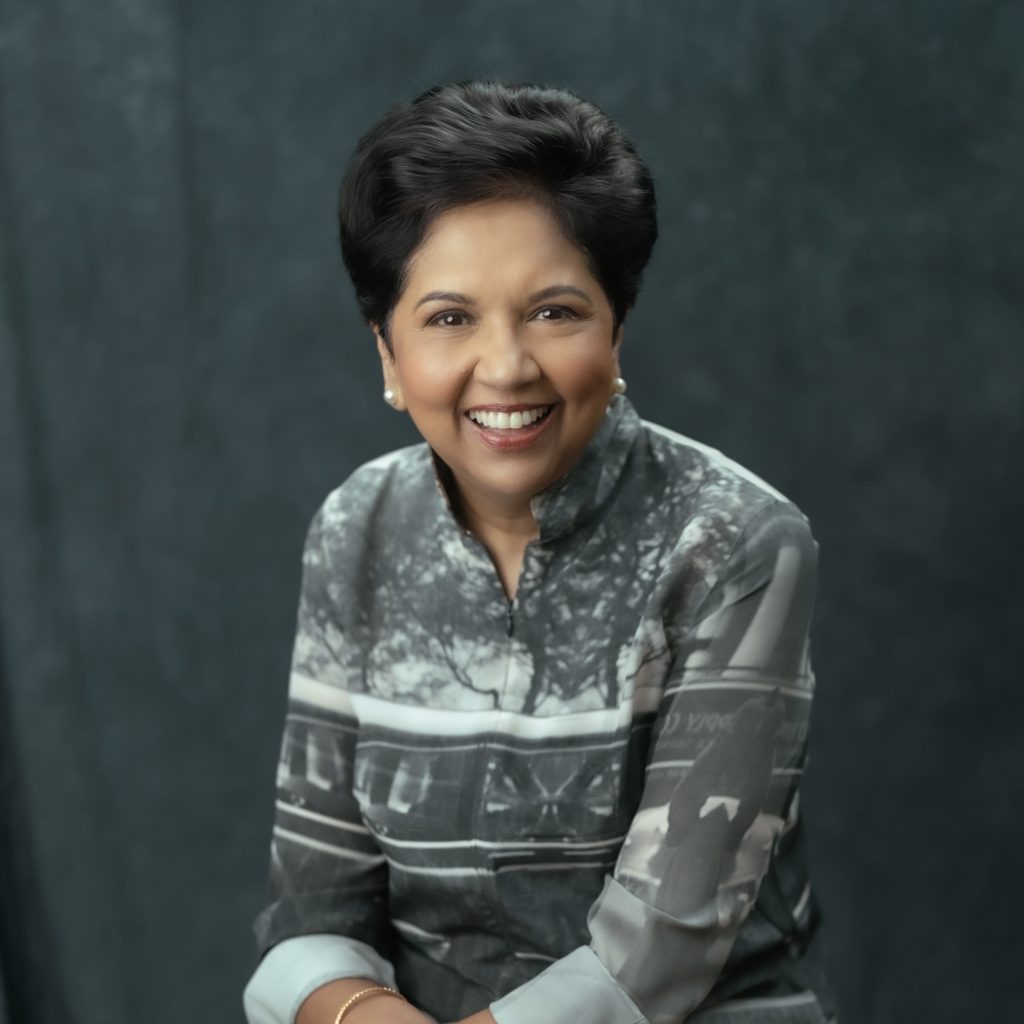
-
The secret staying power of Lands’ End: A Decision Makers exclusive
Post Views: 507Executive Produced by Neil A. Carousso
“Don’t get stuck in your ways,” might seem like unexpected advice coming from Lands’ End CEO Jerome Griffith.
Why? Well, the company is heading towards its 60th anniversary and, as Bloomberg’s Carol Massar noted during a recent Decision Makers interview with Griffith she hosted alongside WBBM Newsradio’s Cisco Cotto, Lands’ End has been called “stodgy” in the past.
Decision Makers interviews offer a peek inside some of the most well-known consumer brands in the country and the executives, such as Griffith, who run them.
Massar noted that the “stodgy” comment came before Griffith, formerly of Esprit, Tommy Hilfiger and Tumi, took the helm of Lands’ End in 2017.
While the company – which has evolved from a yacht supply store in Chicago to an apparel and home goods company in the past half century – is still known for dependable, comfortable apparel under his leadership, Griffith explained how it has to change things up in order to keep appealing to customers.“You have to stay flexible,” he said. For Lands’ End, this focus on flexibility extends from its manufacturing decisions and its corporate culture to its product distribution and marketing.
Griffith explained that the company has worked for years to make sure its products aren’t all made in the same place.
“We didn’t want to be tied into any one country,” he said, adding that no one country represents more than 20% of manufacturing for the Lands’ End. This approach has helped the company avoid some of the potential impact of COVID-19 pandemic-related shutdowns, including a recent two-month shutdown in Vietnam.
Since the pandemic began two years ago, Griffith said Lands’ End has also embraced the benefits of remote work. Designers have been able to work using 3D technology. Customers have been consistently satisfied with the fit of clothes made by the company according to the TruFit app and Lands’ End has managed to keep up low return rates for its products, said the CEO.
Remote work has helped current employees become more efficient and it has also helped the Dodgeville, Wisc., company expand its talent base, said Griffith. Recently, workers have started coming back to the office for “collaboration sessions,” but the CEO doesn’t think working there will ever be the same.
“What you’re really seeing is a wholesale change of how people work,” he said.
As the company becomes more flexible about remote work, it has also been carving out a new distribution strategy. In addition to its own stores and website, Lands’ End offers its products online through Amazon, online and in-store through Kohl’s and is working with QVC for TV shopping.
Griffith said that offering Lands’ End at brick-and-mortar Kohl’s stores has only increased online sales for the company. Products are expected to be available at more than 500 Kohl’s locations by the end of the year.
“You’re relevant because you’re there,” he said.
Another collaboration aimed at keeping the brand relevant was with Draper James, Reese Witherspoon’s clothing line.
“It makes it cool, and the cool factor is something you can’t…really put your finger on,” Griffith said.
However, the most important part of staying relevant is understanding your customer, he said. And Griffith really knows the Lands’ End customer.
She’s a woman in her 40s or 50s living in suburbia. She’s affluent but frugal, she works and she is tech savvy, doing most of her shopping from her smartphone. Her children probably still live at home and she picks out her husband’s clothes for him – at Lands’ End.
Griffith said most of the men’s apparel produced by the company is actually purchased by women. School uniforms are another big seller.
The typical Lands’ End customer is also loyal and shops with the company for an average of 17 years, he said.
In recent years, the company has also worked to include more diversity in its marketing. Just before the pandemic, in 2019, Lands’ End launched “Let’s Get Comfy,” a campaign based on its customers’ biggest priority: comfort.
It proved to be a prophetic campaign when the pandemic forced people at home and reduced a need for more formal office attire.“Better to be lucky than smart,” said Griffith of the campaign.
Going forward, he said the company still faces challenges such as supply chain issues and inflation. Even so, he thinks the future looks bright for Lands’ End.
“If you look at 2021, it was really a great year for the company. Overall, we had a good increase in revenue to the point where it’s our best year since 2011,” he said. “It’s our best earning year since 2014, when we were spun off from Sears as a public company. So, we feel really good about where the year ended up.”
Griffith said the company is looking to hire more employees, to expand its distribution and to grow its uniform business. He also said they are always keeping an eye on customer data as more Gen X customers join Baby Boomers as loyal Lands’ End shoppers.
Towels and sheets made by Lands’ End might even be the key to reaching out to millennials, he told Massar and Cotto. His children, at least, have been big fans and are spreading the word to their friends.
At the end of the day, Griffith said that keeping both Lands’ End customers and team members happy is the key to success, especially through difficult times such as a pandemic.
“I think the most important thing we should really be doing is keeping our people motivated,” he said.
Decision Makers is a joint exclusive production from Bloomberg and Audacy and executive produced by Neil A. Carousso.
-
After more than 50 years in Queens, COVID could force master stylist into retirement
Post Views: 416By Joe Connolly and Neil A. Carousso
NEW YORK (WCBS 880) — COVID-19 has had a devastating impact on salons and barbershops. It’s an indication that other parts of the economy are struggling to fully recover from the pandemic.
“The business is down by 50 percent,” said long-time Queens master stylist Michael Alick on the WCBS Small Business Spotlight, sponsored by Dime Community Bank.
Alick learned the craft from his father and began working as a master stylist in Manhattan in the 1970s. About 10 years later, he opened his own salon on Bell Boulevard in Bayside where he’s worked ever since.
“I’m going to be fully retired after I worked 50 years in the industry,” he lamented. “So, I’ve seen the good days and I’ve seen bad days, but COVID is the worst.”
Alick told WCBS 880 that people are not getting haircuts and coloring their hair professionally like they used to, because they’re working remotely and dressing more casually even when they are in the office.
“Nobody’s spending money, if they make the money, like they used to, such as like luxury, going out, go to the hairdresser, look good, dress up,” he said.
The master stylist recently took up a chair twice a week at a salon in Greenwich, CT where he sees more young professionals than Bayside.

Michael Alick recently took up a chair twice a week at a salon in Greenwich, CT. Photo credit Facebook/Michael’s Place Salon But, he keeps a chair at an Asian-owned salon in Bayside out of loyalty to the clients that have stayed with him through the pandemic.
“I have loyal clients from 10 to 30 years. They were loyal to me, so I work in Bayside two days just to take care of them,” said Alick.
He credits his longevity in the industry to personal relationships.
See more on this story on the WCBS Small Business Spotlight video above.
-
Small Business Comeback Tour: The Scout Guide Bergen County
Post Views: 435By Joe Connolly and Neil A. Carousso
BERGEN COUNTY, NJ (WCBS 880) — This hyper-local community news resource goes the extra mile to support small businesses.
“We’re Bergen County girls,” said Chris Doherty who joined her co-editor Eileen Sweeney on the WCBS Small Business Comeback Tour, sponsored by PSE&G.
Together, Doherty and Sweeney curate and share positive stories of local businesses across Bergen County, which is one of 65 current markets in The Scout Guide network.
“We really get to know their story, and then, our goal is to tell the story to our community,” Doherty said.
That includes personalized photo shoots that Doherty and Sweeney organize with local photographers for stories featured in their annual print guide. Volume 2 of The Scout Guide Bergen County was released in January.
“We mailed about 10,000 to targeted mailing routes (and) we have the other 5,000 or so scattered throughout Bergen County at our brick-and-mortar stores ready to get our businesses’ message out to our local community,” noted Sweeney.
See more about The Scout Guide and how they promote local businesses on the WCBS Small Business Comeback Tour video above.
-
WCBS Virtual Business Breakfast LIVE: Featuring Fmr. PepsiCo CEO Indra Nooyi
Post Views: 513Executive produced by Neil A. Carousso
SAVE THE DATE: Participate in a LIVE conversation with one of Forbes’ Most Powerful Women in Business on Thursday, March 24 at 9 AM EDT at WCBS880.com!
NEW YORK (WCBS 880) – Join WCBS business reporter Joe Connolly live on Thursday, March 24 at 9 AM ET for a discussion with Indra Nooyi, an international star of business who came from humble beginnings in India and rose through the corporate ranks to lead and transform PepsiCo, headquartered in Westchester County.
Nooyi is one of the most influential, admired and forward-thinking leaders of our time.
As a Fortune 500 CEO, she spearheaded PepsiCo’s Performance with Purpose initiative to develop more health-conscious and nutritious products while limiting the company’s environmental footprint, which was initially met with resistance from her fellow executives. Nooyi will address the art of making tough decisions aimed at long-term growth and sustainability.
“Business today is not for people who sort of are stuck in the business models of the past,” Nooyi said in a conversation with Connolly in advance of the live virtual event. “You’ve got to sit down and say, ‘Coming out of the pandemic, given where consumers are going, how’s my offering differentiated enough that people want to come to it? And, how do I then figure out how to get in in front of the consumer and keep that excitement and novelty factor going?’”
She will also answer your questions throughout the virtual event during “LIVE with Joe” segments in which Connolly will facilitate an engaging conversation between Nooyi and our loyal audience of business owners, entrepreneurs and dreamers. You’ll be able to comment during the livestream with questions on sales, operations, labor, or anything else you would like to ask Nooyi. Don’t miss out on this once-in-a-lifetime opportunity to get business advice from a giant in corporate America!
“You don’t have to use shareholder value, but for small and medium-sized enterprises, thinking back and saying, ‘How do I keep growing?’ Growth is oxygen,” explained Nooyi, adding she uses profitability to measure business growth. “You’re not in the nonprofit business. How do you grow and generate profits at the same time?”

Indra K. Nooyi is the author of the book “My Life in Full: Work, Family and Our Future” in which she offers a blueprint for advancing society in a post-pandemic world. Photo credit Penguin Random House The Yale University alumna is the author of the book “My Life in Full: Work, Family and Our Future” in which she offers a blueprint for advancing society in a post-pandemic world. Nooyi, a mother of two daughters, writes about her challenges raising a family while traveling and working long hours. She will share her inspiring story juggling family and career, and her message for today’s business leaders on how to set your team up for success and achieve work-life balance.
As a resident of Connecticut, Nooyi serves as co-chair of Gov. Ned Lamont’s Reopen Connecticut Advisory Group, which consists of a panel of local health, business, workforce, and education leaders who have consulted on the reopening of the state’s economy during the COVID-19 health emergency. In this role, Nooyi has taken steps to learn epidemiology from health experts to inform her recommendations on the economic recovery.
Nooyi is the epitome of the American Dream and a firm believer in how businesses can make a difference, inspire generations, and rebuild communities. On the WCBS Virtual Business Breakfast, she will give business owners an inspirational message for recovering fully from COVID-19 and innovating for long-term success. Nooyi will also provide specific growth ideas that you can apply to your business.
Join Joe Connolly and Indra Nooyi for the WCBS Virtual Business Breakfast LIVE on Thursday, March 24. Log on to WCBS880.com at 9 AM ET to watch and participate. We look forward to connecting with you then!
About Indra Nooyi:
Indra Nooyi is the former Chairman and CEO of PepsiCo (2006-2019); a Fortune 50 company with operations in more than 180 countries.
In this role, Mrs. Nooyi was the chief architect of Performance with Purpose, PepsiCo’s pledge to do what’s right for the business by being responsive to the needs of the world around us. As part of Performance with Purpose, PepsiCo was focused on delivering sustained growth by making more nutritious products, limiting its environmental footprint and protecting the planet, and empowering its associates and people in the communities it serves. During her tenure, PepsiCo grew net revenue more than 80%, and PepsiCo’s total shareholder return was 162%. Nooyi directed the company’s global strategy for more than a decade and led its transformation, including the divestiture of its restaurants into the successful YUM! Brands, Inc., the acquisition of Tropicana and the merger with Quaker Oats that brought the vital Quaker and Gatorade businesses to PepsiCo, the merger with PepsiCo’s anchor bottlers, and the acquisition of the Russian company Wimm-Bill-Dann, the largest international acquisition in PepsiCo’s history.
Prior to becoming CEO, Mrs. Nooyi served as PepsiCo’s President and Chief Financial Officer beginning in 2001, when she was also named to the company’s Board of Directors. She was responsible for corporate functions, including finance, strategy, business process optimization, corporate platforms and innovation, procurement, investor relations and information technology. From February 2000 to April 2001, Mrs. Nooyi was Senior Vice President and Chief Financial Officer of PepsiCo. Mrs. Nooyi also served as PepsiCo’s Senior Vice President, Corporate Strategy and Development from 1996 until 2000, and as PepsiCo’s Senior Vice President, Strategic Planning from 1994 until 1996. Before joining PepsiCo in 1994, Mrs. Nooyi spent four years as Senior Vice President of Strategy, Planning and Strategic Marketing for Asea Brown Boveri, a Zurich-based industrials company.
She was part of the top management team responsible for the company’s U.S. business as well as its worldwide industrial businesses, representing about $10 billion of ABB’s $30 billion in global sales. Between 1986 and 1990, Mrs. Nooyi worked for Motorola, where she was Vice President and Director of Corporate Strategy and Planning, having joined the company as the business development executive responsible for its automotive and industrial electronic group. Prior to Motorola, she spent six years directing international corporate strategy projects at The Boston Consulting Group. Her clients ranged from textiles and consumer goods companies to retailers and specialty chemicals producers. Mrs. Nooyi began her career in India, where she held product manager positions at Johnson & Johnson and Mettur Beardsell, Ltd., a textile firm.
Mrs. Nooyi served as a member of the PepsiCo Board of Directors from 2001 and February 2019. Mrs. Nooyi is now a member of the board of Amazon, where she chairs the audit committee. She sits on the supervisory board of Philips, where she is also a member of the nominating and corporate governance committee. She is a member of the International Advisory Council of Temasek; an independent director of the International Cricket Council; and a member of the American Academy of Arts & Sciences. She is on the Dean’s Advisory Council at MIT’s School of Engineering, and a member of the MIT Corporation. She also serves on the boards of the Memorial Sloan Kettering Cancer Center and the Partnership for Public Service. Additionally, Mrs. Nooyi is the Class of 1951 Chair for the Study of Leadership at West Point where she helps enhance the ability of both the Department of Behavioral Sciences and Leadership and the U.S. Military Academy to fulfill the mission of developing leaders of character. She also serves as an advisor to several early-stage companies.
She is the author of the book, My Life in Full: Work, Family and Our Future, her much-anticipated memoir that offers insight and a call-to-action from one of the world’s most-admired business leaders on how our society can blend work and family — and advance women — in the 21st century. Mrs. Nooyi has received fifteen honorary degrees. In 2007, the Government of India awarded her the Padma Bhushan, the country’s 3rd highest civilian honor. That same year, she was named an “Outstanding American by Choice” by the US State Department. In 2019, her portrait was inducted into the Smithsonian National Portrait Gallery. In 2021, Indra became an elected member of the American Philosophical Society and joined the Board of Trustees of the National Gallery of Art. She was also inducted into the Asian Hall of Fame and National Women’s Hall of Fame.
She holds a B.S. from Madras Christian College, an M.B.A. from the Indian Institute of Management in Calcutta, and a Master of Public and Private Management from Yale University.
Mrs. Nooyi is married to Raj Nooyi and has two daughters, Preetha and Tara.
-
Car Dealerships Find New Revenue Streams Amid Supply Chain Crunch
Post Views: 390By Joe Connolly and Neil A. Carousso
BRANFORD, Conn. (WCBS 880) — The automotive industry has been facing some of the worst lingering economic impacts from the COVID-19 pandemic. It has forced manufacturing plants and dealerships to make adjustments to its processes in order to serve customers.
A pandemic pivot two years ago at Premier Automotive Group in Branford, CT became an entirely new business model that has optimized the customer experience.
“We came up with a digital model and and quite frankly, it was a model that we had for several years that customers didn’t really use a lot and that’s where they could take the process and buy the entire car online,” said Premier Automotive Group president Robert Alvine on the WCBS Small Business Spotlight, sponsored by Dime Community Bank.
He said 20 percent of their customers now buy and lease cars fully online then Premier delivers it to their home or office.
“We realized that customers kind of liked the process and whether they like the entire process or part of the process, we wanted to keep that digital process in place,” he said. “We at least can tell a customer that we’re going to sell you the car the way that you want to buy it.”
It’s that high-level of customer service that has kept Alvine in business for more than 21 years. He started his career in commercial banking where he saw first-hand the strong relationships between bank managers and their customers. That’s a key element Alvine has implemented at his dealerships.
“We have really tried hard to make sure that we have an authentic experience and a transparent experience for everyone,” he said.
The biggest challenge for car dealerships and their customers are the ongoing supply chain issues. There are fewer cars on the lot than usual, meaning it could take months for someone to get the make and model they want.
“I think there’s going to be an amazing forensic on this entire thing in the supply chain and materials because we’re seeing the complete downfall of the just-in-time inventory processes in manufacturing plants,” said Alvine, continuing, “When the raw materials aren’t available just-in-time, there’s no stock piles with them. And I think some last year, if you look at some of the car companies that made some good gains, they’re ones that might have had some stockpiles of parts.”
He notes car dealerships are “hoarding” the supply of new vehicles that they have on their lots rather than trading with other dealerships as they would pre-pandemic.
“Used cars are rising in price because there (are) more used cars available than there are new cars available,” Alvine said, adding that used cars appreciated 30 percent in value last year. That’s highly unusual for a depreciating asset.
Because people are keeping their cars longer, there’s greater demand for automotive parts to improve used car performance. Premier Subaru in Branford began selling parts online in 2007 under a different branding. Fifteen years later, that adjacent service helped the group survive the pandemic.
“That’s like a supplemental line, if you will and we sell parts, believe it or not, all over the globe,” said Alvine.
Premier keeps its parts inventory in-house.
See more on the solutions car dealerships and manufacturers are coming up with to combat pandemic pressures on the Small Business Spotlight video above.
News Stories
Social Feeds

VIDEO: Told the airline to book us on the next flight out (SPONTANEOUS TRIP!)

VIDEO: The Taylor Swift Effect | WCBS Business Breakfast

VIDEO: Future of NYC | WCBS Business Breakfast

VIDEO: Reasons for New Yorkers to be Optimistic | WCBS Business Breakfast

VIDEO: NYC's AI Chatbot | WCBS Business Breakfast







